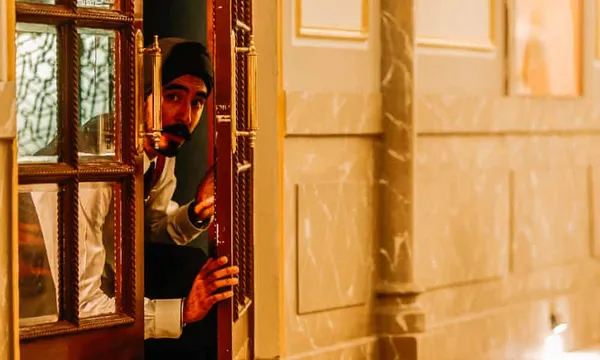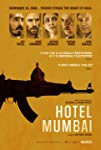Eye For Film >> Movies >> Hotel Mumbai (2018) Film Review
Hotel Mumbai
Reviewed by: Jennie Kermode

On the 26th of November 2008, ten members of the Pakistani terrorist group Lashkar-e-Taiba began a series of attacks in Mumbai in which 174 people died and many more were seriously injured. One of those attacks took place at the Taj Palace and Tower hotel, where approximately 1,000 guests were staying at the time. With local police overwhelmed and limited in their capacity to respond without back-up, there would have been many more deaths were it not for the courage of hotel staff who remained there to help them. Anthony Maras' film pays tribute to those staff members and explores the dynamics of the event based on eyewitness accounts.
It's structured like a traditional disaster movie. We get to meet assorted small groups of people - including the terrorists themselves - whose stories will intersect later on. This tight focus on the (mostly fictional) characters enables the film to ignore the wider political dimensions of the incident and much of what might have divided audiences, though ironically it has been criticised in India for being too timid in this regard. The name of Lashkar-e-Taiba is not even mentioned - instead we know only that the terrorists are being directed by an unseen man whom they refer to as 'the Bull', who has promised their families money if they carry out their mission. This has been meticulously planned and a satellite phone allows up-to-date instructions to be given so that changes on the ground can be accommodated for, yet little observations as the story develops demonstrate that these men have very little education. By showing us their general naivety and moral conflicts, Maras humanises them without making room for uncomfortable levels of sympathy.

One of the issues that aggravates the terrorists (and makes the splendour of the hotel seem unreal to them) is the massive wealth gap in the region. Early shots of street children and factory workers substantiate this without coming across as preachy. When it comes to some of the mega rich hotel guests, most viewers will feel as if they're watching people from a different planet. In scene in which one looks through photographs and orders girls to be sent to his room (girls whose fate we never learn) seems intended to nourish feelings of resentment, but other wealthy guests are treated with sympathy- especially the beautiful Zahra (Nazanin Boniadi) and her new American husband David (Armie Hammer), who soon become desperate to reach their baby, who is trapped in their room with his young nanny (Tilda Cobham-Hervey).
Representing the other half of society (and the local population) is Sikh waiter Arjun (Dev Patel), introduced saying goodbye to his pregnant wife and their infant child at the start of the film. His relationship with his boss (head chef Hemant, played by veteran star Anupam Kher) is the most interesting in the film and feels distinctly more authentic than much of what is going on around them. Both actors are on top form and really elevate their scenes.
The film is elegantly staged and highly polished. There are little details that don't quite gel - the baby cries are wrong, for instance - and there are occasional pieces of truly awful dialogue, but these are minor quibbles. The biggest problem with it is poor pacing. Yes, it's necessary to create a sense of time passing and of the stresses that develop amongst the trapped guests as a result, but excessive repetition ends up depleting the tension until the film itself feels far longer than two hours. It really shouldn't be necessary to make the audience feel trapped as well.
Working in the film's favour is the fact that because these are real events there's no room for criticism of character choices - viewers will find themselves more aware of how easy it is to make poor decisions under stress, and also of just how few options were available to many of those who found themselves in danger. Maras sensibly avoids exaggerating individual incidents for the sake of added drama. Whilst the film needs more aggressive editing, it doesn't suffer from an inability to communicate the terror of those trying to hide in an unfamiliar building with very little idea of what's going on.
Though it's not as gripping nor, ultimately, as powerful as it might have been, Hotel Mumbai is not exploitative in the ways many had feared and tells its story well enough to satisfy most viewers. It only occasionally gives way to crude exposition. Patel and Kher are worth the price of admission on their own and the film's epilogue contributes an unexpectedly joyous note to what might otherwise be grim viewing. There's a celebration here of the institution itself, of the dedication that creates a well-run hotel and how that craft - even in ordinary circumstances - can be a thing of beauty.
Reviewed on: 29 Nov 2019
















